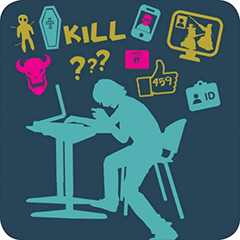What to do when your online identity is stolen?
As soon as you notice someone uses your online photos, name and/or other personal matters, or those of your child, it is extremely important to stop it as soon as possible. The more the information spreads, the harder it will be to get it of the Internet.

These are the steps you need to take:
1) Report misuse of your data to the administrator of the online platform, like Facebook, Twitter, Tumblr or YouTube. Sometimes it's hard to find where to send your request. In most cases it is to be found where you can also change your settings, at 'Help'. It will lead you to an overview page, where you can find the information you need. Facebook and YouTube also make it possible to directly report a photo or video. Every platform has its own way to report problems. Facebook and Twitter call it 'reporting problems'; YouTube calls it 'flagging'. Primarily it is important to find out what exactly went wrong in your case; what 'violation of conditions' has taken place? The fact that you feel bullied most of the time not sufficient to describe the problem. Bullying in itself shouldn't be what you report, instead you need to point out what exactly makes the bullying damaging to you. The easiest way is when pictures are clearly offensive. When you're not 18 yet and you're pictures are used in a sexual manner, it is also likely quick action will be taken. In that case it may also be helpful to contact www.helpwanted.nl. If it concerns photos you took yourself, you own copyrights or 'intellectual property'. When someone misuses those photos, make sure to report that someone is 'using them unauthorized'. On Facebook click on the photo, then press 'Options' and then 'Report'. At the bottom left you see the words 'Is this your intellectual property?'.
2) Bullying in itself is not a criminal offense, however the way it takes place can be. In that case you can tackle the bullying by pressing criminal charges. Name rights that have been violated in your report. Nobody can use photos you took unauthorized, because of the intellectual property. Sometimes you can also invoke your portrait rights, when someone uses a photo with your face on it and you suffer damage from that. When people say unfriendly things about you, you can rely on defamation, libel and slander. The United Nations have set out fundamental rights in the Convention on Children's Rights, concerning the protection of a child's identity and privacy.
3) Keep track of everything that's happening and make screenshots. You can use this as proof when you talk to the police and eventually in court.
4) If you know the offender and he or she lives in your neighborhood, go to the police. The local police officer can help you and may be able to address the offender about his online behavior.
5) When ultimately nothing has worked and the online platform isn't responding, notify the police. You can do this at the police station. If for some reason this isn't possible, contact www.vraaghetdepolitie.nl. You can ask questions on this website. It is also possible to chat with a police officer specialized in juvenile cases twice a week. He or she can give you tips and help you further.
6) The things that happened to you can make you feel very sad or lonely. It helps to talk to someone you trust about it. Would you rather talk to someone you don't know personally? Go to www.meldknop.nl. It will redirect you to the staff of Kindertelefoon or Pestweb.
Tips for parents and teachers:
1) Try to get the offensive pictures of the Internet as soon as possible. If not possible right away, make sure you get help. Alert meldknop.nl or the organizations behind it. You can find them on the website. The police will also help you with advice and/or filing a report. In the case of online sexual abuse, contact www.helpwanted.nl. Www.mediaopvoeding.nl is also there for advice.
2) Keep calm. Especially when it comes to your behavior in the presence of your child. Tell them you are glad they came to you, be decisive and try to react calmly. Avoid panic: it benefits the child if you are (or seem) confident there will be a solution.
3) Be alert to the child's behavior. It may be too hard for the child to deal with it all by himself. Contact the school to make sure they keep an eye on him or her too. If necessary, take care of psychological help through a pediatrician. Even after a while, this can still be helpful.